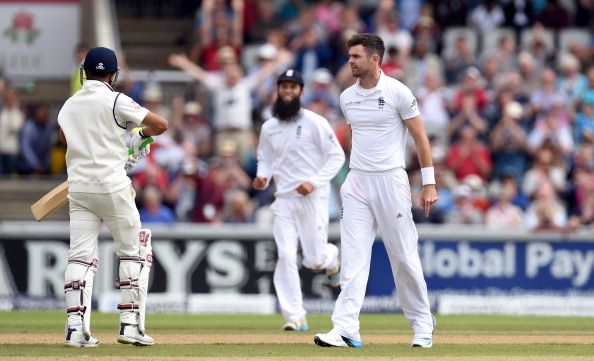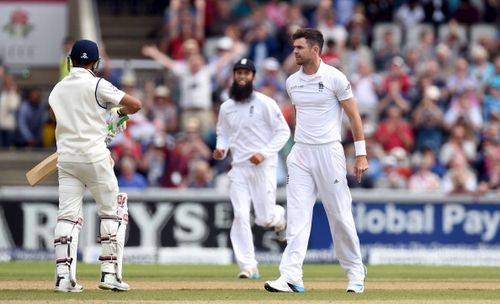
Is James Anderson's foul language a part of the game?

Humour has no barrier, so long as certain unparliamentary words are uttered in jest. When a Test cricketer unleashes a barrage of invectives against an opponent when they were leaving the field after a hard session, it is not banter, it is unacceptable foul mouth.
In the usage and abusage guide to good English of the Australian judicial commissioner appointed by the International Cricket Council (ICC) to go into the charge and counter-charge made by India's all-rounder Ravindra Jadeja and the canny England fast bowler James Anderson, the Lancastrian's language may be perfectly refined, but it is repugnant and unacceptable in most civilised places.
The Australian judge cleared Anderson of shoving Jadeja when they were returning after the morning session on day two of the Trent Bridge Test, and obviously did not think much of the fast bowler using highly questionable language "due to lack of evidence," even as the Englishman admitted telling Jadeja to "f*** off and get in your dressing room."
What evidence the judge was looking for after his own compatriot, umpire Bruce Oxenford, gave the lurid descriptive of the language Anderson used on the field of play. Isn't the umpire's deposition enough to nail Anderson?
Importantly, Anderson did not dispute his calling Jadeja a "f***ing prick" and "f***ing c***," nor did he have anything to offer in justification to say that he would "break Jadeja's teeth."
Yet, Judge Gordon Lewis possibly dismissed the outburst as a normal reaction of fast bowlers!
Former England player and now a highly respected TV commentator David Lloyd goes back to the era when there were no ICC match referees and refers to the highly volatile Fred Trueman and Dennis Lillee and there was no 'mummy mummy he's pushed me' in those days.
To rub it in, Lloyd reminds that the Indian players may be mega superstars in their own country, but not in England.
In Jadeja's case, match referee David Boon curiously found insufficient evidence to convict him on a level two charge and reduced it to level one. And Lewis let the Indian off disagreeing with Tasmanian.
England coach Peter Moores sees Anderson's boorish behaviour as part of his playing the game hard and that's what international sport is all about. He goes a step further to say that people come to watch players putting everything on the line when they play.
There have been instances where ICC match referees treated the offenders from Australia and England with kid gloves while coming down heavily on the players from the subcontinent for much negligible offences.
It is intriguing that the ICC commissioner delivered the judgment in a jiffy, though he will give an elaborate version of his findings to the ICC soon.
India captain Mahendra Singh Dhoni, who happened to be a key witness to pushing as he was returning with Jadeja did not mind the aggression part or the even bad language, but he was livid with physical contact.
Perhaps, he was convinced that Anderson's was cognizable offence but unfortunately for him there was no tell-tale evidence by way of camera footage.
It all boiled down to his word against Anderson's and his supporters who appeared before Lewis's six-hour inquisition. No wonder the Indian captain prevented manager Sunil Dev from hammering out an amicable solution to save the situation.
Obviously, the new ICC chairman Narayanswamy Srinivasan also did not want a combustible issue at his doorstep when he is trying to rule world cricket with the help of ECB and Cricket Australia.
If that was the case, he could have easily prevailed upon Dhoni to go slow unless the whole thing was stage managed so perfectly. The whole world knows nothing moves in the Indian board without his nod.
Level three hearings are not common. The last time it was brought against Harbhajan Singh in Australia in 2008. He was convicted but later let off after the Indian board sent the high-profile former civil servant and board president Inderjit Singh Bindra to fight it out.
There is one lesson for the Indian players. They should brush up their English to use flowery language on the field of play and see whether it is acceptable to the "highbrow" Englishmen, match referees and ICC legal eagles.
The question is whether the Indian, Pakistani and Sri Lankan players use the language Anderson used on the field? The ICC has to answer it.